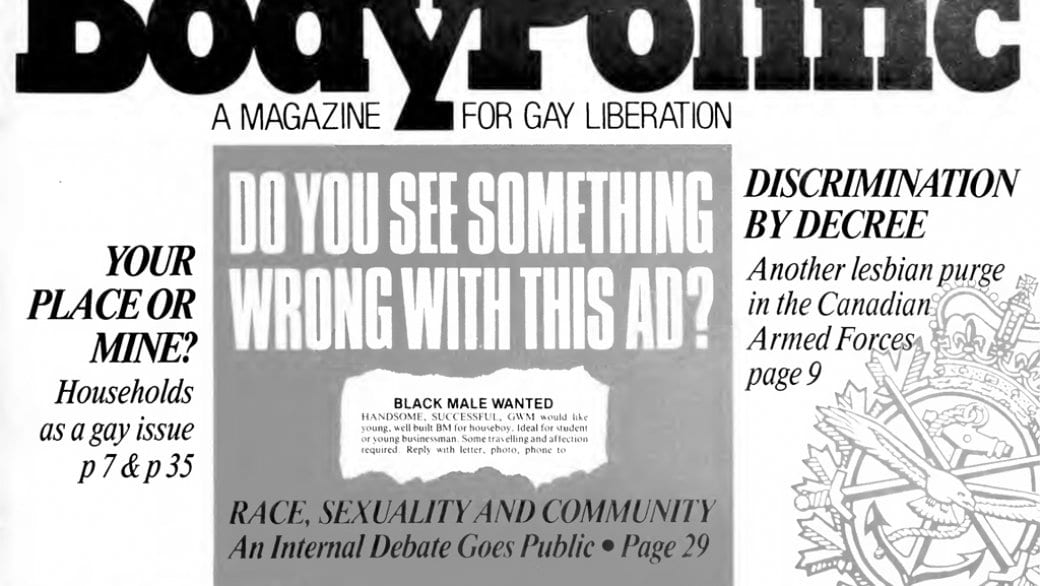In 1985, in the waning years of The Body Politic, a self-described “handsome, successful gay white male” submitted a classified ad looking for “young well built black man for houseboy.”
After a debate, the collective decided to run the ad.
This episode was returned to again and again as an example of anti-black racism during a symposium commemorating the 45th anniversary of the founding of The Body Politic at the Mark S Bonham Centre for Sexual Diversity Studies at the University of Toronto.
Speakers debated and examined the legacies of the gay and lesbian publication, with many of the speakers focusing on the exclusions of black people, indigenous people and people of colour from The Body Politic.
“For black queers, we live and love in the ruins of the aftermath of The Body Politic, not because of it, but in spite of it,” said Rinaldo Walcott, the director of the Women and Gender Studies Institute at the U of T. “The archive of The Body Politic reminds me that we are not noticed, not seen, but we are hyper-visible nonetheless in queer culture.”
Lali Mohamed, a co-founder of Deviant Productions, an alternative media organization focused on social justice, said that part of the impetus to launch Deviant Productions was disillusionment with how Pink Triangle Press portrayed black people.
“At that time, Xtra and Fab magazine existed, but they, like their predecessor, did not have any real investment in amplifying the voices or experiences of black people,” he said. “Their gay liberation paper did not include people who looked like me.”
“Queer communities all over this city were cultivating ideas, community spaces, and caring for one another with such tremendous generosity and creativity,” he said. “Why is Pink Triangle Press missing all of this magic-making happening in the margins? These communities, almost always led by women, were fashioning and imagining new ways of being in this world to make it not only more livable but more just.”
Syrus Marcus Ware, an artist, activist and researcher, urged the audience to use the experiences and narratives of black, indigenous and non-white queer and trans people as a starting point to understand LGBT history throughout North America.
“By doing so, we gain a different entry point into trans and queer collective timelines of resistance and archives and we interrupt the way in which these omissions produce a whitewashed canon,” he said. “The holes in our archives tell larger stories than the actual content.”
Ware said that he often speaks about the need to include these histories in queer and trans archives with white gay activists.
“I talk about the important work of trans women of colour leading our movements both in Toronto, but also in New York and across North America,” he said. “And on more than one occasion they lean forward and said to me, ‘You know it’s not true.’”
“They feel such confidence in their own memory as being the memory, the archive, the impartial record of human history, that we simply are not there, we were never there in their minds,” he said.
Mohamed cited numerous instances of anti-black racism from mostly white LGBT institutions in Toronto, including black people being denied entry into bars on Church Street and other institutions and community organizations calling the police on black trans women.
“Our community, this Church and Wellesley community has been violently and viciously racist,” he said.
“The Bathhouse Raids and the activism that followed it is often told as a story of white gay heroism,” said Ware, citing one example of exclusion. “But in fact black, indigenous, people of colour were centrally involved in the days following the raids.”
Billy Merasty, an indigenous actor and playwright, was shaking the doors of the legislature during the protests, Ware said. Gay Asians of Toronto helped organize the legal defences of people who were charged with being found in the bathhouses.
“And I wonder why these stories are not part of the dominant histories of and the archives of the raid?” Ware asked.
Walcott said that black people’s work at the forefront of immigration battles in Canada have helped white gay and lesbian people sponsor their partners from elsewhere.
“But when you tell that story, we disappear,” he said.
Mohamed said that black communities, especially led by black women, have created spaces and movements that fill in these holes.
He pointed to Black Lives Matter Toronto, Black Queer Youth, the AIDS service organizations that focus on black people and people of colour and Rye Pride as examples.
“If ever there’s a time to turn our hearts and minds to arming the reality of this work, the work of capturing all of our lives and pivoting away from colonizing discourse of a whiteness, a white, moneyed male whiteness, that has underpinned PTP for so long, both at The Body Politic and its ugly, ugly cousin Xtra, it is today,” he said. “Happy birthday.”
Editor’s Note, June 11, 2016: An earlier version of this article mistakenly quoted Lali Mohamed as referring to “organizing discourse.” The correct phrasing was actually “colonizing discourse.”

 Why you can trust Xtra
Why you can trust Xtra


